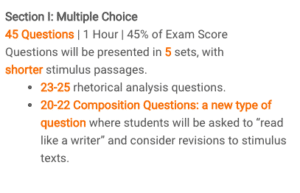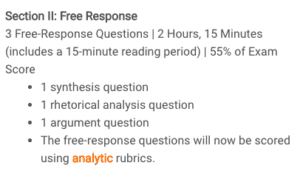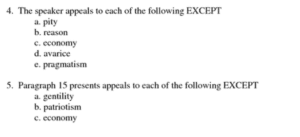5 Ways to Get a 5 on the AP English Language Exam
3 min read•december 14, 2021
Brandon Wu
Brandon Wu
AP English Language ✍🏽
224 resourcesSee Units
After taking the AP English Language course and exam this year, I can assure you that it is very easy to score a 5 on the exam by following these five tips.
1. Understand the format of the exam and study.
Before beginning preparation, you will need to understand the format of the exam. AP Language has a new exam format with multiple choice questions that resemble the SAT English section (revising and editing). College Board has also released new analytic rubrics that replace the previous ‘holistic’ rubrics.

Image courtesy of College Board

Image courtesy of College Board
2. Pay attention to everything your teacher says in class.
The AP Language exam is unique in the fact that there isn’t much memorization to be done compared to other AP exams, such as US History or Calculus. In fact, I would recommend that you don’t buy any preparation books for this exam, as you can be successful by participating in class. Most AP Language teachers have had years of experience with the exam, and they will give you helpful strategies for you to succeed. If you do not have a good teacher, I would encourage you to constantly practice to build your skills in analyzing literature and writing effective essays.
3. Read literature beyond the scope of your class syllabus.
Students often lack analytical skills before taking the AP Language exam. Although teachers assign certain books at the beginning of the year, reading other books will be to your benefit. I recommend reading extra fiction literature (Brave New World or 1984 for example) to help with your analysis skills. Nonfiction literature (such as Amusing Ourselves to Death or Outliers) will be helpful in essays as supporting evidence.
4. Learn necessary literary vocabulary.
Knowledge of literary and tone terms is important for the rhetorical analysis essay and multiple choice. Here are two examples where knowledge of vocabulary would be necessary to answer these questions correctly. You have to know what avarice and gentility mean to eliminate or select them as the answer. Furthermore, you’ll need to know what literary terms such as synecdoche or periodic sentence mean.

Image courtesy of Rose Bryan from DocPlayer
I recommend studying up on both this list, as it includes a variety of tone terms in addition to literary vocabulary.
5. Practice using both unofficial and official resources.
This is by far the most effective way you can get a 5 on the AP Lang Exam. For essay practice, College Board uploads previous free response questions located here. The free response questions also include rubrics of strong and weak student samples. For multiple choice practice, I recommend College Board’s sample exam questions in their course description on page 122. If you need more multiple choice exam practice, CrackAP is a useful resource with over fifty unofficial practice tests.
Browse Study Guides By Unit
🧠Exam Skills
📑Exam Review - Synthesis Essay
📝Exam Review - Rhetorical Analysis Essay
💬Exam Review - Argument Essay
🧐 Multiple Choice Questions
📆Big Reviews: Finals & Exam Prep
🥇Unit 1 – Claims, Reasoning, & Evidence
🗂️Unit 2 – Organizing Information for a Specific Audience
👀Unit 3 – Perspectives & How Arguments Relate
🔚Unit 4 – How writers develop arguments, intros, & conclusions
🎀Unit 5 – How a writer brings all parts of an argument together
👥Unit 6 – Position, Perspective, & Bias
🥊Unit 7 – Successful & Unsuccessful Arguments
😎Unit 8 – Stylistic Choices
😈Unit 9 – Developing a Complex Argument

© 2023 Fiveable Inc. All rights reserved.